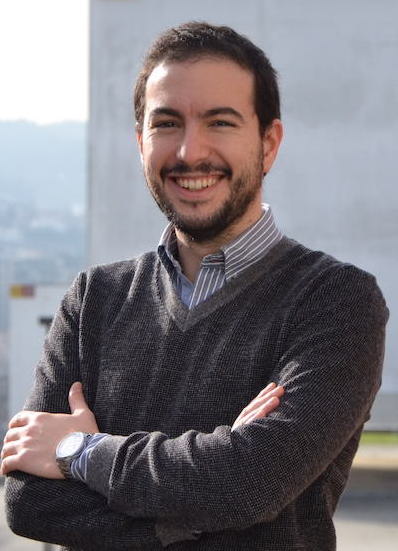Industry day
Roberto Natella
(CRITIWARE)
Title: Advancing Fault Injection and Dependability Evaluation in the Software-Driven Telecom Industry
Abstract: In this talk, I will present my experience in R&D projects with Critiware s.r.l., an Italian start-up and former spin- off of the Federico II university, together with customers that are addressing new software dependability challenges. Part of this experience matured in the context of a broad research cooperation with Huawei Technologies, which has been aimed at applying the approaches from the dependable computing discipline (such as software fault injection and fault tolerance, software reliability and stress testing, and failure data analysis) in two key areas: the dependability of the “cloud telecom” and of mobile computing. The presentation focuses on the lessons learned and suggestions for establishing a fruitful cooperation between academics and professionals in the field dependable computing.
Bio: Roberto Natella is a cofounder and consultant for the Critiware s.r.l. start- up company (www.critiware.com). I got the Ph.D. degree in computer engineering in 2011 from the Federico II University of Naples, and still cooperate with my “alma mater” in the context of research projects on dependability benchmarking, software fault injection, and software aging and rejuvenation, and their application in operating systems and virtualization technologies. I contributed, as author and reviewer, to several leading journals and conferences on dependable computing and software engineering, and have been organizing the workshop on software certification (WoSoCer) within the IEEE Intl. Symposium on Software Reliability Engineering (ISSRE).
Francisco Maia
(SafeCloud Technologies Sarl)
Title: Data management and privacy in a world of data wealth
Abstract: Data storage and processing is at the center of every human activity and business. Among all types of data being stored and processed, there is added value in personally identifiable data. Not only it has direct value for building contact networks but also allows fine grained profiling. Profiling and extensive service usage metric collections allow unprecedented knowledge about what people want, buy, and most importantly what will buy next. Additionally, it allows to infer possible behavior and personality without ever needing to resort to actual human interaction. Naturally, this raises a number of important privacy concerns. At SafeCloud Technologies we aim to develop technology that allows online services and applications to continue to leverage data analytics but will, by design, preserve each individual’s right to privacy and control over their own data. We believe that a free, united and peaceful world is necessarily built on protecting individuals privacy and ability to openly relate with one another. Moreover, we believe technology can actually support this vision.
Bio: Co-founder and CEO of SafeCloud Technologies Sàrl, a Swiss startup focused on the development of data storage and data processing technology with specific data privacy requirements. Researcher at HASLab - High Assurance Software Laboratory - from University of Minho and INESC TEC. Obtained his PhD from the Universities of Minho, Aveiro and Porto (MAP-i Doctoral Program in Computer Science) in 2015 advised by Professor Rui Oliveira. He is currently involved in the SafeCloud Project (www.safecloud-project.eu) focusing on privacy-preserving technology for Cloud Computing environments. President of AMU - Cooperação Lusófona Por Um Mundo Unido, a Portuguese Non-profit association that focuses on projects of development cooperation.
Hans-Peter Schwefel
(GridData)
Title: ICT and Data-Management for Dependability of Electricity Distribution Grids: Opportunities and Barriers
Abstract: While the operation of the transmission and high-voltage electricity grids uses a high degree of automation, automated data processing and data analytics are only slowly entering into the medium-voltage grid operation and are rarely present in the low-voltage grid. A substantial part of the European distribution grids is run by small and medium-sized Distribution System Operators (DSOs), serving from few hundred to several hundred thousand customers. This talk discusses the opportunities that are created by leveraging novel data sources and digital technologies for enhanced dependability of electricity distribution grids. Challenges for the small end medium-sized DSOs will be discussed covering data fusion based on heterogeneous data sources, the interfacing to critical control applications, data protection, and the tension between long-term strategic planning of digitial grid operation as opposed to ad-hoc or opportunistic deployment.
Bio: Hans-Peter Schwefel is managing director of the company GridData (www.griddata.eu); the company provides services and SW solutions to electricity distribution system operators in order to leverage existing and novel data sources for efficient and dependable distribution grid operation and for novel customer interaction systems. Hans is in addition Professor for Communication Networks at Aalborg University, Denmark. In parallel to his position at Aalborg University, he has previously been Scientific Director of the Research Center for Telecommunications (Forschungszentrum Telekommunikation Wien - FTW) in Vienna, Austria, in 2008-2016, in which up to 100 employees were developing and analyzing ICT solutions for the specific use-cases of industrial partners in the application domains Intelligent Energy, Intelligent Transport Systems, and Telecommunications. His research focuses on communication networks and their applications for critical infrastructures with main interest in performance and dependability aspects. Before he joined Aalborg University in 2003, he was a project manager at Siemens Information and Communication Mobile, supervising research projects and responsible for the development of technical concepts for next generation mobile networks. He obtained his doctoral degree in the area of IP traffic and performance modeling from the Technical University in Munich, Germany.
Antonio Bovenzi
(Banca D'Italia)
Title: Importance of Automation Tools to Develop and Operate Reliable Services
Abstract: Bank of Italy IT systems are undergoing a strong technological and architectural review to foster the delivery of new services and to seamless carry out institutional functions ensuring timely response and preserving reliability and security. The elective platform for the implementation and delivery of new IT services is based on (thousands of) Linux systems deployed on several virtualized infrastructures and separate data centers. This talk will present the approach adopted by Bank of Italy in order to govern the evolution of distributed systems which is essential to guarantee rapid service development, reliability, security, standardization, reproducibility, auditability, efficiency and scalability. Throughout the talk we will discuss the foundations of the approach which are based on the formal definition of the IT infrastructure by means of code and data structures managed via SCM (Software Change Management) tools. These tools also allow to centralize and to automate resource provisioning (compute, network and storage), to apply systems configuration in a controlled manner, and to manage the entire system life cycle including the transition to production environments and systems maintenance (e.g., new features deployment, upgrading, security updates and bug fixes).
Bio: Antonio Bovenzi is an IT Expert at Bank of Italy. He is currently leading workgroups dealing with the evolution of the platform for developing and managing Linux systems, and the design of the open source virtualization infrastructure of the Bank of Italy. He was a member of the ESCB Vision 2020 study for the design of the pan-European Instant Payments system. He also collaborated to other projects among which the redesign of Bank of Italy web site and the implementation of the new infrastructure to the Italian National Interbank Network (RNI). He got the Ph.D. degree in computer engineering from the Federico II University of Naples in 2013, working in the area of dependability evaluation of mission-critical systems.